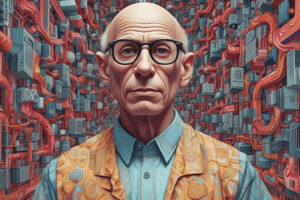Podcast
Questions and Answers
What was the title of Foucault's first major book?
What was the title of Foucault's first major book?
- The Birth of the Clinic
- The Order of Things
- The History of Sexuality
- The History of Madness (correct)
In which country did Foucault spend time as a cultural diplomat?
In which country did Foucault spend time as a cultural diplomat?
- Poland
- Sweden (correct)
- West Germany
- France
What was the name of the university where Foucault became head of the philosophy department?
What was the name of the university where Foucault became head of the philosophy department?
- University of Tunis
- University of Clermont-Ferrand
- University of Paris (Sorbonne)
- University of Vincennes (correct)
What was the name of Foucault's book that explored the role of power in modern societies through institutions like prisons?
What was the name of Foucault's book that explored the role of power in modern societies through institutions like prisons?
In what year did Foucault become a fellow of the Collège de France?
In what year did Foucault become a fellow of the Collège de France?
Which organization did Foucault co-found to investigate and expose poor prison conditions in France?
Which organization did Foucault co-found to investigate and expose poor prison conditions in France?
What was the title of Foucault's book that explored the history of the prison system in western Europe?
What was the title of Foucault's book that explored the history of the prison system in western Europe?
What was the name of Foucault's only book-length work on literature?
What was the name of Foucault's only book-length work on literature?
What were the three types of power described by Foucault in his analysis of power?
What were the three types of power described by Foucault in his analysis of power?
Flashcards are hidden until you start studying
Study Notes
Life and Career of Philosopher Paul-Michel Foucault
-
Paul-Michel Foucault was a French philosopher, historian of ideas, writer, political activist, and literary critic who addressed the relationships between power and knowledge.
-
His theories have influenced academics, especially those working in communication studies, anthropology, psychology, sociology, criminology, cultural studies, literary theory, feminism, Marxism, and critical theory.
-
Foucault was born in Poitiers, France, in 1926, into an upper-middle-class family and was educated at the Lycée Henri-IV, École Normale Supérieure, and the University of Paris (Sorbonne).
-
His first major book, The History of Madness, was published in 1961, followed by The Birth of the Clinic (1963) and The Order of Things (1966), which displayed his increasing involvement with structuralism.
-
From 1966 to 1968, Foucault lectured at the University of Tunis before returning to France, where he became head of the philosophy department at the new experimental university of Paris VIII.
-
Foucault was admitted to the Collège de France in 1970, where he remained a member until his death.
-
He became active in several left-wing groups involved in campaigns against racism and human rights abuses and for penal reform.
-
Foucault later published Discipline and Punish (1975) and The History of Sexuality (1976), in which he developed archaeological and genealogical methods that emphasized the role that power plays in society.
-
Foucault died in Paris from complications of HIV/AIDS, becoming the first public figure in France to die from complications of the disease.
-
Foucault was interested in philosophy from an early age and studied under Jean Hyppolite, an existentialist who influenced his conviction that philosophy must develop through a study of history.
-
Foucault was an avid reader and interested in literature, psychology, and the work of Swiss psychologist Ludwig Binswanger.
-
Foucault spent the next five years abroad, first in Sweden, working as a cultural diplomat at the University of Uppsala, then in Poland and West Germany.
-
Foucault's first book, Mental Illness and Personality, exhibited his influence from both Marxist and Heideggerian thought, covering a wide range of subject matter.Michel Foucault's Life and Career Summary
-
Foucault had romantic and sexual relationships with various men, including biochemist Jean-François Miquel and physicist Jacques Papet-Lépine.
-
In Uppsala, Sweden, Foucault spent much of his time in the university's library researching for his doctoral thesis, which was rejected by Sten Lindroth, a positivistic historian of science.
-
In Warsaw, Poland, Foucault was the director of the University of Warsaw's Centre Français. He entered into relationships with several men, including a Polish security agent who wanted to trap him in an embarrassing situation.
-
In Hamburg, West Germany, Foucault became the director of the Institut français Hamburg and entered into a relationship with a transvestite.
-
In 1960, Foucault completed his primary thesis, titled "Madness and Insanity: History of Madness in the Classical Age," which traced the evolution of the concept of madness through three phases.
-
Foucault's secondary thesis was a translation and commentary on Immanuel Kant's Anthropology from a Pragmatic Point of View, titled Introduction à l'Anthropologie.
-
Foucault took a tenured post in philosophy at the University of Clermont-Ferrand in 1960 and published a book devoted to Raymond Roussel in May 1963.
-
In April 1966, Foucault published "The Birth of the Clinic: An Archaeology of Medical Perception," which considered the ways in which the history of medicine and hospitals bring about a particular way of looking at the body.
-
In 1966, Foucault took a position teaching psychology at the University of Tunis in Tunisia and was there during the anti-government and pro-Palestinian riots that rocked the city in June 1967.
-
In 1968, Foucault became a tenured professor at the Centre Expérimental de Vincennes, where most of the courses were Marxist–Leninist oriented.
-
Foucault became a fellow of the prestigious Collège de France in 1970 and took up a chair in what he called the "history of systems of thought." In 1975, he published "Discipline and Punish: The Birth of the Prison," which considered the ways in which power is wielded in modern societies through institutions like prisons.The Life and Work of Michel Foucault
-
Foucault was elected to the Collège de France in 1969 and gave 12 weekly lectures a year for the rest of his life.
-
He co-founded the Groupe d'Information sur les Prisons in 1971, which investigated and exposed poor prison conditions in France.
-
Foucault was active in anti-racist campaigns and protested against perceived racist killings of Arab migrants.
-
He traveled widely, giving lectures in Brazil, Japan, Canada, and the United States over the next 14 years.
-
Foucault published "Surveiller et punir: Naissance de la prison" in 1975, offering a history of the prison system in western Europe.
-
His book "The History of Sexuality: The Will to Knowledge" was published in 1976, exploring the concept of power and rejecting Marxist and Freudian theory.
-
Foucault continued to be a political activist, protesting against government abuses of human rights around the world.
-
In 1980, he became a visiting professor at the University of California, Berkeley, giving lectures on "Truth and Subjectivity".
-
Foucault contracted HIV and eventually developed AIDS, dying in 1984.
-
His partner founded the first national HIV/AIDS organization in France, AIDES, after his death.
-
Foucault's archive was sold to the National Library of France for €3.8 million in 2012.
-
He was a leftist throughout much of his life, though his particular stance within the left often changed.Overview of Michel Foucault's Life and Work
-
Foucault was a French philosopher who was initially involved in leftist campaigns, but became disillusioned with communist ideology while working in socialist Poland in the 1960s.
-
He argued that children could give sexual consent and signed a petition calling for the decriminalization of all "consensual" sexual relations between adults and minors below the age of fifteen.
-
He was accused by Guy Sorman of being a paedophile who raped Arab children while living in Tunisia in the late 1960s, but these claims have been disputed.
-
Foucault explored transgression in his philosophical work and was described by his colleague Pierre Bourdieu as exploring the link between transgression, knowledge, and power.
-
His work was dark and pessimistic, but also highlighted areas of domination and how society can build structures to minimize domination.
-
Foucault's analysis of power came in two forms: empirical and theoretical, and he described three types of power: sovereign power, disciplinary power, and biopower.
-
Foucault was critical of "theories" that tried to give absolute answers to everything and considered his own "theory" of power to be closer to a method than a typical "theory".
-
Force relations were an effect of difference, inequality, or unbalance that existed in other forms of relationships, and power was a complex group of forces that came from "everything" and therefore existed everywhere.
-
Foucault's theory of disciplinary power aimed to use bodies' skills as effectively as possible and to prevent these skills from being used to revolt against the power.
-
Biopower referred to power over populations and primarily rested on norms that were internalized by people, rather than external force.
-
Death and the Labyrinth: The World of Raymond Roussel was Foucault's only book-length work on literature, and he explored theory, criticism, and psychology with reference to the texts of experimental writer Raymond Roussel.
-
Foucault's work on power aimed to increase people's awareness of how power has shaped their way of being, thinking, and acting, and by increasing this awareness, making it possible for them to change their way of being, thinking, and acting.
Studying That Suits You
Use AI to generate personalized quizzes and flashcards to suit your learning preferences.




